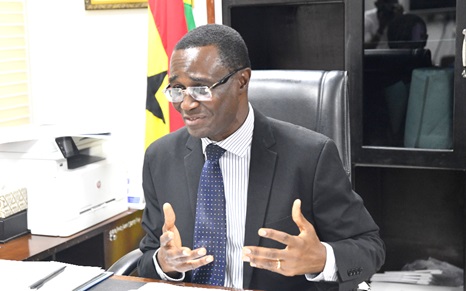
Users laud new property rate collection regime
A section of the public has lauded the payment platform designed for the collection of property rate, insisting that the new regime has eliminated challenges that impeded compliance to the provisions on property rate in the Local Governance Act, 2016 (Act 936).
They explained that the previous regime was such that people had to move several kilometres to the offices of the metropolitan, municipal and district assemblies (MMDAs) to pay for the rates on their properties.
Speaking to the Daily Graphic, the mostly property owners or people who had responsibility over a property in the country and had knowledge of the payment platform said the new system was easy to use and better than the previous regime of paper distribution of bills and collection of physical cash.
They maintained that the previous system was also associated with bureaucracies and secrecy, which caused suspicion, and, therefore, people were reluctant to comply.
“I have to move several kilometers to the Akuapem South Municipal Assembly in Aburi to pay property rate, because of that I stopped paying for many years until we heard this year that a new platform had been introduced for the purpose of property rate collection.
“We tried and the platform was easy to use; we paid less than GH¢150 and received the electronic receipt,” a property owner at Pakrom, Nana Odie Yaw, said.
An associate of a property at Ogbojo in the Adentan Municipality in the Greater Accra Region, Richard Amoah, said the assembly used to bill his property at GH¢793 per year, but with the advent of the new platform, his bill had dropped to GH¢245.
Aside from paying a reduced rate, he said, it was also exciting to access and make payment for the purpose of property rate in the house rather than moving to the assembly’s office at Adenta.
Lack of education
Other property owners, who were yet to log onto the platform to pay their bills, also claimed lack of knowledge of the new digitised platform for property rate collection.
An office clerk at the Ministry of Defence, Diana Andrew, called for improved education on the introduction of the new platform, saying “some of us have never heard anything about it”.
“In the last five years, I have been staying at Oyarifa in the La-Nkwantanang Madina Municipality, but I have never heard of any digitised payment platform for property rates.
“I am ready to pay, if I am educated on how to use it to pay,” she added.
Context
The government directed the Ghana Revenue Authority (GRA) to partner the metropolitan, municipal and district assemblies for the collection of the property rate.
The unified common property rate platform was officially launched in April this year after the successful identification and billing of over 10.12 million properties across the country.
Gains
So far, the platform has accrued over GH¢20 million within three months of operation.
Hitherto, the assemblies, on their own, were collecting an average of GH¢56 million per year across the country.
A 10-year trend analysis indicates that the assemblies together collected just about GH¢500 million over the period.
However, with the new system, should the assemblies charge just GH¢200 per property, the country can rake in GH¢1.77 billion a year.
How it works
To make payment, first-timers must log into the myassembly.gov.gh by entering their phone numbers in the field provided, and then validate the account.
They must click on the login button and await a one-time password (OTP) to be sent to their phone numbers.
The OTP received must be entered in the space provided and then click to verify.
With a good internet connectivity, property owners or property rate payers would be able to make payments through the portal in compliance with the law.
As a result, technical support officers (TSOs) and clients support officers (CSOs) have been recruited to visit the various communities and homes across the country to assist people without smart devices such as mobile phones and computers to register and make payments.
Challenges
Despite the positives, the new system is challenged with lower-than-expected patronage.
For this reason, the government has served notice, through the GRA and MMDAs, to start prosecuting defaulters from November 1, 2023.
Equally, names of property owners who do not comply with the law will be published in the newspapers.
Additional recruits
The Head of Communications of the GRA Property Rate Project Office, Ernest Adade, said GRA had recruited additional 7,000 officers to educate and aid people to access the portal to make payment.
He explained that the new recruits had been deployed to the various MMDAs to augment and support the collection of property rate.
“We have deployed 7,000 people since September this year to boost the collection process, and so the issue of lack of information is now being addressed,” he said.
Expert opinion
A local government consultant, Michael Osae, in an interview, explained that this was, indeed, a big jump and that GRA, assisted by the MMDAs, must be encouraged to intensify nationwide enforcement as part of measures to ensure compliance with property rate payments.
He said the successful implementation of the portal was an inspiration to the MMDAs’ efforts to streamline the financial processes to boost economic growth.
“I think that adopting technology will ensure transparency, reduce administrative burdens and minimise the scope for financial irregularities,” Mr Osae, who has been pushing for the adoption of technology into the operations of the MMDAs, added.
This report is produced under the DPI Africa Journalism Fellowship Programme of the Media Foundation for West Africa and Co-Develop.
Email:
